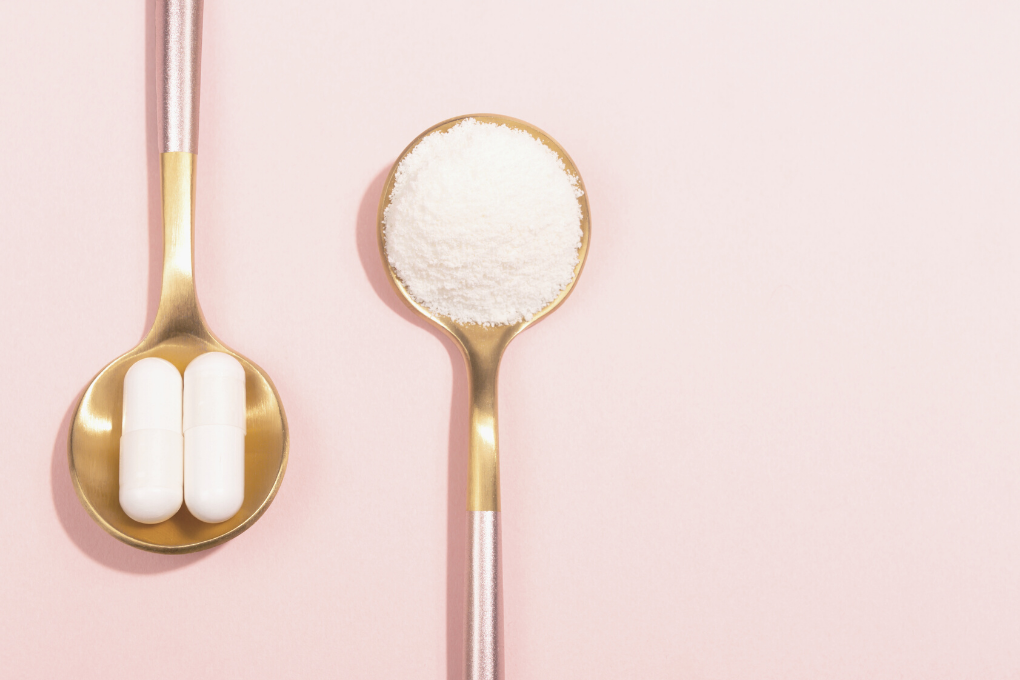Nourish Health Food Pharmacy
Why collagen is the most requested supplement on the market
Collagen is one of the most requested supplements on the market, with claims alleging that it can improve matters such as skin elasticity and hydration, to bone strength and gut health. Who wouldn’t want to get on board? In this blog we will look at the scientific evidence behind collagen supplementation, to see if these claims are accurate.
Firstly, it is important to mention that our body is pretty self-sufficient and naturally makes collagen from breaking down dietary protein into single amino acids and combining these again with the help of certain co-factors.
So, do we really need to supplement with collagen to meet our requirements? Making sure we are meeting our protein needs and eating plenty of fruits and vegetables (particularly leafy greens and citrus fruits containing high levels of collagen-boosting nutrients) will ensure that our body is producing optimal levels.

Collagen is important for many functions in the body with its primary role being a major component of connective tissue, where it acts like a stretchy matrix, giving structure and strength to bones, muscles, skin, hair, and blood vessels.
Collagen supplements are made from either bovine (cow) or marine (fish) sources. Essentially it is the connective tissue from these animals that are extracted and then ground into a fine powder. A common misconception is that there are vegan sources of collagen, but this is not the case!
However, there are vegan ‘collagen-boosting’ supplements available, which contain a variety of foods that are high in nutrients and antioxidants such as vitamin C, biotin, and zinc. These are co-factors in the production of collagen and aim to boost the body’s own production, rather than providing collagen peptides directly.
As well as different sources of collagen on the market, there are also different types of collagen depending on the molecular structure. 80-90 percent of the collagen found in the body consists of type I, II and III which are known as fibrous collagen, meaning the molecules are packed very tightly together. Collagen type I is the most abundant in the body, and what you want to look for on the label if you are considering supplementation.
So, what does the evidence say for collagen supplementation and skin health? There are a handful of studies supporting the claim that oral collagen supplementation can assist in the reduction of fine lines and improve skin elasticity and hydration.

The reason that ingestion of collagen peptides is preferred over topical creams in this case is the understanding that topical skin treatments often don’t reach the deeper dermal layers to have a substantial impact. Additionally, oral ingestion of collagen stimulates the body to produce type 1 collagen in the dermis layer.
A study in 2019 found that skin hydration and elasticity was significantly increased in women who were supplementing with collagen, and although there needs to be more studies to support this claim, this is encouraging evidence!
Collagen supplementation for bone and joint health has the most promising data behind it. Studies show that collagen supplementation may be beneficial in assisting with osteoarthritis, joint inflammation, and bone density.
In a recent study with post-menopausal women, the bone mineral density (aka bone strength) of women taking collagen peptides significantly increased when compared to the placebo group. A 2020 review of the evidence concluded that taking collagen daily significantly reduced joint inflammation, stiffness, and pain in patients.

Contrary to popular belief, there is no evidence to suggest that collagen supplementation is beneficial for gut health. This is not to mean that it has no effect at all, but more so, there has not been the funding to conduct research in this area.
Further studies are required to determine the true benefits that collagen supplements may have as this is still an emerging area in the world of natural health and nutrition.
Overall though, it is a safe supplement to take and the evidence for benefits in joint, bone and skin health seem promising. Consuming a diet rich in fruits, vegetables and good quality plant and animal protein will ensure that we have the building blocks the body needs to produce collagen naturally. If you are considering taking any new supplements make sure you talk to a qualified health professional who can help you pick one best suited to your needs.

Eve Bishop
Nutritionist
This blog post was written by Eve Bishop, Nutritionist at Nourish Health



